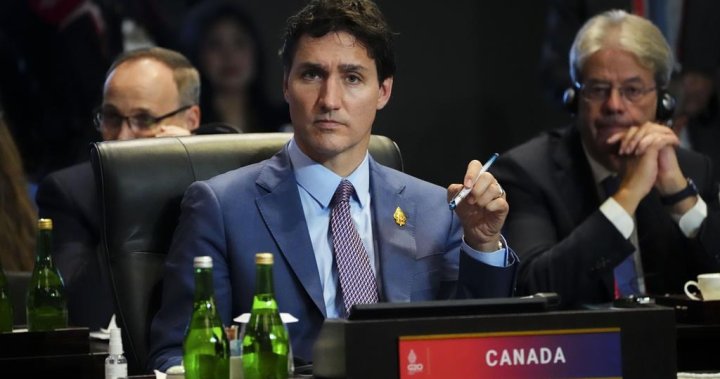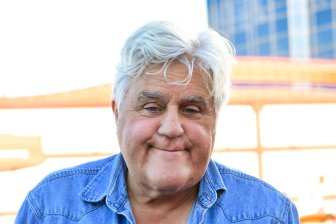G20 summit: Trudeau pledges $830M in funding for developing countries – National | Globalnews.ca
Prime Minister Justin Trudeau is announcing funding for developing countries to improve their infrastructure and make COVID-19 vaccines, at a G20 summit where geopolitics looms over work to shore up global economic systems.
At the G20 summit in Indonesia, Trudeau pledged Monday $750 million for a Crown corporation to finance infrastructure projects in Asia over three years, starting next March.
It’s the largest chunk of the forthcoming Indo-Pacific strategy that the Liberals have announced so far, and part of a G20 project meant to help low- and middle-income countries have safer and more sustainable cities.
Read more:
G20: Canada pushes to further isolate Russia, quiet on chance of meeting China’s Xi
Read More
-
![]()
G20: Canada pushes to further isolate Russia, quiet on chance of meeting China’s Xi
“It will also make our supply chains stronger and create good jobs,” Trudeau said in remarks prepared for a closed-door event hosted by Indonesia, the U.S. and the European Union.
The funding will be administered by FinDev Canada, which currently has a mandate to operate in Sub Saharan Africa, Latin America and the Caribbean. It will now also help fund projects in developing countries in Asia.
Trudeau told leaders that sovereign wealth funds can help governments abroad build schools and hospitals.
“If we want to close the infrastructure gap, we need to continue finding ways to incentivize greater private sector investment. No amount of public money can single-handedly fix this issue,” the prime minister’s remarks read.

Trudeau is also announcing $80 million for global health systems, with most of the funding going to a World Bank project that helps countries prevent pandemics and respond to them.
The funding will also support projects that help developing countries manufacture COVID-19 mRNA vaccines.
Yet geopolitics will likely overshadow the pledges leaders make at the summit, as countries debate how to respond to Russia’s invasion of Ukraine and China’s growing assertiveness.
Canada is among the most forceful of countries pushing for G20 leaders to call out Russia for worsening inflation and global security through its war in Ukraine. But other countries have held back from calling out Russia, in an attempt to maintain good relations with the West and Moscow.
Read more:
Canada sanctions 23 Russians, announces $500M military aid package for Ukraine
As summit host, Indonesia has urged countries to focus on finding common ground, to make sure there is some statement of consensus when the summit closes Wednesday.
“We can see that they’re going through conniptions, trying to kind of get a declaration to save them from the embarrassment of not having a communique. So this is going to be very tricky,” said Andrew Cooper a professor with the Balsillie School of International Affairs at the University of Waterloo, who studies G20 summits.
Meanwhile, the Prime Minister’s Office says Trudeau had to intervene at a closed-door G20 health forum Tuesday after Russian Foreign Affairs Minister Sergey Lavrov claimed American biolabs were undertaking nefarious activities in Ukraine.
Trudeau’s office says he told his peers that the claims were “absolute garbage” and that leaders must work with facts.

Trudeau also spoke Tuesday with Chinese President Xi Jinping, and his office says he raised concerns about Chinese interference in Canada, following claims of de facto police stations operating in Canada and of China reportedly meddling in the 2019 general election.
The two leaders also spoke about North Korea’s missile launches, and the UN summit on biodiversity that China is hosting in Montreal next month.
Cooper told reporters in Bali that Canada could be following the same pattern Australia faced a decade ago, when it was isolated by China but gradually found areas of consensus with Beijing while forming stronger ties with other countries in Asia.
Read more:
U.S. objects to China’s ‘aggressive actions’ towards Taiwan, Joe Biden tells Xi Jinping
“Canada’s been in the penalty box for a few years now,” he said.
“This is a very different China. President Xi in a consolidated position. If he’s not the new Mao, he’s certainly in a position where he can be a central figure that can work in a way that we didn’t anticipate when the G20 was created.”
The Canadian Chamber of Commerce said the Liberals are taking a practical approach to dealing with China, by saying it will help inform businesses of the risks of working in China and let them decide whether to do so.
“You need to work with China on issues like climate change, but also we have to recognize that China’s a strategic rival, and they don’t play by the same rules as everybody else,” the group’s CEO Perrin Beatty told reporters in Bali.

He also said Ottawa needs to now outline its trade priorities in Asia.
“We need to be strategic. It needs to be holistic; it needs to be well communicated, so people know what the policy is,” he said.
He added that Canadian business needs assistance to take advantage of the numerous trade agreements Ottawa has signed and is currently negotiating.
“The three Fs — food fuel fertilizer — Canada has in bundles. And what’s needed now is a clear strategy on the part of Canada to put those resources to work and to ensure that we’re able to actually deliver those commodities to the rest of the world,” he said.
Beatty also said Canada should do “a full post-mortem” of supply-chain shocks during the COVID-19 pandemic, and figure out whether to warehouse critical goods in Canada, and to what extent Canada should limit trade to friendly countries.
© 2022 The Canadian Press
For all the latest world News Click Here





